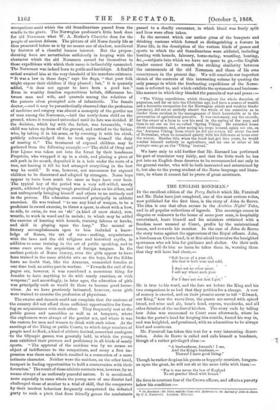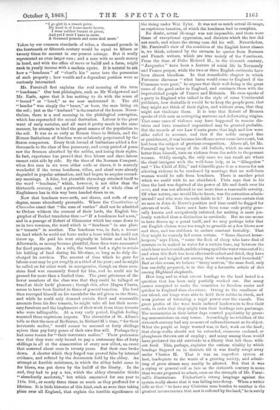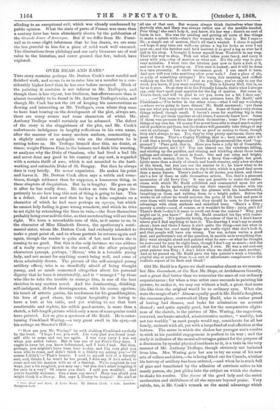THE ENGLISH BONDMAN.*
Ir the excellent edition of the Percy Ballads which Mr. Furnivall and Mr. Hales have just completed, one of the most curious relics, now published for the first time, is the story of John de Reeve. The idea is one that often occurs in the Arabian Nights' Tales, and in all popular collections of legends. The sovereign comes in disguise or unknown to the house of some poor man, is hospitably entertained, hears himself and his ministers criticized with a freedom most unusual at Court, profits by the unintentional lesson, and rewards his monitor. In the case of John de Reeve the story turns against the oppressions of the Royal officers. John, a bondman on Crown land, is at first afraid to receive the benighted sportsmen who ask him for guidance and shelter. On their oath that they will do him no harm he takes them in, warning them that they will have bad cheer,— " Salt bacon of a year old,
Ale that is both sour and cold, I dare eat no other moat, I sell my wheat each year For I dare not eat that I get."
He is true to his word, and the fare set before the King and his two companions is so bad that they petition for a change. A vow of secrecy is exacted, and on their promise never to tell " Edward, our King," how the reeve lives, the guests are served with spiced bread, red wine and ale, boar's head, capons, woodcocks, and all other dainties of the mediaeval kitchen. The story ends by telling how John was summoned to Court soon afterwards, where he broke the porter's head for keeping him outside, forced his way in, and was knighted, and pensioned, with an admonition to be always kind and courteous.
Mr. Furnivall has taken this text for a very interesting disser- tation. John de Reeve is called and calls himself a bondman, though of a rather privileged class :—
" A husbandman, forsooth! I am, And the King's bondman,— Thereof I have good liking."
Though he rather despises his guests as beggarly courtiers, hangers- on upon the great, he will not sit at the same table with them :—
"For it was never the law of England To set gentles' blood with bound."
He lives in constant fear of the Crown officers, and affects a poverty below his condition :—
• on Bondmen : the Name and the Class with Reference to the Ballad of John de Reeve. By F..L FurinvalL Loudon: Trdoner.
"I go girt in a russet gown, My hood is of home-made brown, I wear neither burnet or green, And yet I trow I have in store A thousand pounds and some deal more."
'Taken by our common standards of value, a thousand pounds in the fourteenth or fifteenth century would be equal to fifteen or twenty times its amount in our present coinage. But it really represented an even larger sum ; and a man with so much money in hand, and with the office of reeve or bailiff and a farm, might rank in yearly income with a modern squire. It is natural to ask bow a " bondman " of " churl's kin " came into the possession of such property ; how wealth and a dependent position were so curiously intermixed.
Mr. Furnivall first explains the real meauing of the term "bondman." Our best philologists, such as Mr Wedgewood and Mr. Earle, agree that it has nothing to do with the sense of • ' bound " or " bond," as we now understand it. The old "bonder" was simply the " bauer," or boor, the man living on the soil ; just as the " husband" is the master of the house. Never- theless, there is a real meaning in the philological corruption, which has superseded the actual derivation. Labour is the great -want of early societies, and all meet it pretty much in the same manner, by attempts to bind the great masses of the population to the soil. It was so as early as Roman times in Britain, and the Roman limitations of freedom were sedulously perpetuated by the Saxon conquerors. Every fresh inroad of barbarians added a few thousands to the class of free yeomanry, and every period of peace saw the freemen absorbed by the nobles, and losing their rights. In fact, experience has proved that free labour and slave labour -cannot exist side by side. By the time of the Norman Conquest, when five men in six were either serfs or slaves, it is scarcely wonderful if the terms bondman, villan, and churl were already degraded in popular estimation, and had begun to acquire second- ary meanings. A false, but plausible etymology attached itself to the word "bondman," which, however, is not older than the thirteenth century, and a perverted history of a whole class of Englishmen has in this way been handed down to us.
Now that bondmen were serfs, not slaves, and serfs of every degree, seems abundantly proveable. Where the Constitutions of Clarendon enact that "the sons of rustics" shall not be admitted to Orders without the consent of their lords, the English bio-
grapher of Becket translates thus :—" If a bondeman had a son,"
and in a passage of Robert of Gloucester which has come down to us in two versions, the word which is " bondmen" in one place is"tenants" in another. The bondman was, in fact, a tenant on land which he could not leave under a lease which he could not throw up. He paid his rent originally in labour and in kind.
Afterwards, as money became plentiful, these dues were commuted for fixed payments. As a rule, the tenant had a right to retain his holding of land during his life-time, so long as he duly dis- charged its services. The amount of time which he gave for labour-rent may be put roughly at a third of the year ; and he might be called on for other work in emergencies, though on these occa- sions food was commonly found for him, and he could not be pressed for more than a limited time. The great grievance of the lower members of the class was that they could be tallaged or taxed at their lords' pleasure ; though this, after Magna Charts, seems to have been limited to times of general taxation. The lord then recouped himself on his vassals for the aid given to the State, and while he could only demand certain fixed and reasonable amounts from his free tenants, he might take all but their neces- sary furniture and the implements of their work from those tenants who were talliageable. At a. very early period, English feeling resented these capricious imposts. The chronicler of St. Alban's tells us that the men of Redburne, in Richard IL's time, " for their inveterate malice," would sooner be assessed at forty shillings apiece than pay forty pence of their own free will. Perhaps they had some reason for " their inveterate malice." Their pretension was that they were only bound to pay a customary fine of forty shillings in all at the consecration of every new abbot, an event that occurred about once in twenty years. But their case broke .down. A charter which they forged was proved false by internal svidence, and refuted by the documents held by the abbey. An attempt at forcible resistance, in which the abbey bedel came in for blows, was put down by the bailiff of the liberty. In the end, they had to pay a tax, which the abbey chronicler thinks " abundantly moderate," but which amounted for one year to 118s. 10d., or nearly three times as much as they proffered for a lifetime. It is little histories of this kind, such as were then taking place over all England, that explain the terrible significance of the rising under Gat Tyler. It was not so much actual ill-usage, as capricious taxation, of which the bondman had to complain.
No doubt, actual ill-usage was not impossible, and there were times of exceptional oppression, and districts which the law did not reach, and where the strong man did his will. Nevertheless, Mr. Furnivall's view of the condition of the English lower classes is, we think, coloured by the extracts he quotes from Norman and French writers, which are true mainly of the Continent. From the time of Duke Richard II., iu the eleventh century, " Jacqueries " have been a feature of social life in Normandy and France proper, while the two or three English outbreaks have been almost bloodless. In that remarkable chapter in which Fortescue discusses " what harm would come to England if the Commons were poor," he argues that their well4being is the great cause of the good order in England, and contrasts them with the impoverished people of France and Bohemia. He even speaks of a party in England who talked in the style of some Continental publicists, how desirable it would be to keep the people poor, that they might not think of their rights, and without arms, that they might not vindicate them. It is true that Robert of Briuma speaks of rich men as corrupting matrons and deflowering virgins. That some cases of violence may have happened in remote dis- tricts and have remained unpunished may be granted probable. But the records of our Law Courts prove that high and low were alike called to account, and that if the noble escaped fine or punishment, it was because his offence never came into court, but had been the subject of previous composition. Above all, let Mr. Furnivall say how many of the old ballads, which no one knows better than himself, turn on violence from the noble to the peasant woman. Oddly enough, the only cases we can recall are where the churl intrigues with the well-bore lady, as in " Glasgerion " and " The Child of Elle," and Glanville gave it as a reason for not allowing violence to be condoned by marriage that no well-born woman would be safe from bondmeu. There is another point which we could wish to see elucidated. Fleta says that in his time the lord was deprived of the power of life and death over his servi, and was not allowed to use more than a reasonable severity. Of what nature, one would like to know, was the correction admin- istered? and who were the serfs liable to it? It seems certain that no man in John de Reeve's position and time could be flogged for arrears of work. There must have been sonic code pretty gene- rally known and scrupulously enforced, for nothing is more jea- lously watched than a distinction in servitude. But no one seems to have drawn up a penal tariff, and we may perhaps infer that our English clowns were too rough to grumble at a few blows now and then, and too stubborn to endure constant brutality. That they might be coarsely fed seems certain. " Some discreet house- keepers," says Fleta, " cause the flesh of sheep who have died of murrain to be soaked in water for a certain time, say between the ninth hour and eventide, and then hung up till the water runs out of it; and when this flesh has been afterwards salted and dried, they have it valued and weighed out among their workmen and household." Bad as this seems, we believe " braxy mutton," the same food, only less carefully prepared, is to this day a favourite article of diet among Highland shepherds.
How long and to what extent bondage to the laud lasted is a question that has been only partially worked out. But many causes conspired to make the transition to freedom easier and quicker in England than elsewhere. Owing to the smallness of our island, our kings were able to hold their nobles in check, and were jealous of tolerating a regal power over the vassals. The great profits of the wool trade induced landowners to free their serfs, iu order that they might turn their holdings into pasturage. The monasteries in their latter days courted popularity by grant- ing manumissions on easy terms. Accordingly no rebellion of the sixteenth century had any measure of enfranchisement as its object. What the people at large wanted was, in fact, work on the land ; that sheep-walks should not be extended, commons enclosed, or ploughmen thrown out of employ ; and many among them would have preferred the old servitude to a liberty that left them with- out food. This, perhaps, explains the curious vitality by which bondage lingered ou in districts till it was finally swept away under Charles II. That it was an imperfect system at best, inadequate to the wants of a growing society, and admit- ting of gross abuses may readily be allowed. But that it was a crying or general evil as late as the sixteenth century is more than we are prepared to admit, even on the strength of Mr. Funii- vall's illustrations. Fitzherbert's strong language against the system really shows that it was falling into decay. When a writer tells us that " to have any Christian man bonden to another is the greatest inconvenience that now is suffered by the land," he is surely alluding to an exceptional evil, which was already condemned by public opinion. What the state of parts of France was more than a century later has been abundantly shown by the publication of the Grands Jours Auvergne. But if we differ from Mr. Furni- vall as to some slight inferences that he has drawn, we are none the less grateful to him for a piece of solid work well executed. 2 he illustrations from philology and our early literature are of real value to the historian, and cover ground that few, indeed, have explored.
































 Previous page
Previous page